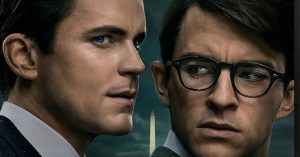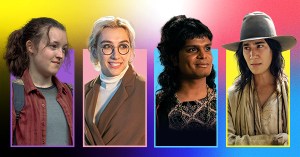RT Interview: Milo Ventimiglia Gets Dark in Pathology, Talks Role In Neveldine & Taylor’s Game
The Heroes star on his decidedly dark thriller.

Thanks to a career-defining role on a television show about superheroes, Milo Ventimiglia has become a household name. But fans of his wholesome roles as Peter Petrelli on Heroes (and before that, as Rory’s true love, Jess Mariano, on Gilmore Girls), had better steel themselves for Ventimiglia’s latest character: a competitive, exacting medical student seduced into a game of sex, drugs and murder in Pathology.
Mark Neveldine and Brian Taylor (Crank) wrote and produced Pathology, a dark thriller packed with slabs of dead bodies and plenty of medical gore — but most importantly, filled with lots of Milo. It’s the first starring grown-up role for the 30-year-old actor, but it won’t be his last; he’s already filmed an appearance in Neveldine and Taylor’s next directorial project, the futuristic MMO-based thriller, Game. Think a character named Rick Rape sounds brutal? Check out Ventimiglia’s twisted star turn in Pathology, where he goes head-to-head (and scalpel-to-scalpel) with fellow murderous docs Michael Weston (The Last Kiss), Lauren Lee Smith (The L Word), and Johnny Whitworth (Empire Records).
In Pathology you play Ted Grey, a medical student sucked into a deadly game…
Milo Ventimiglia: He’s a forensic pathologist who’s kind of at the top of his game, who finds himself in a world that he’s not in control of.
Is this the darkest character you’ve played so far in your career?
MV: I think [I’ve] never quite played a character like this before, a guy who is involved in the sorts of things he’s involved in, but I also play a pretty sick fucker in Nevaldine and Taylor’s next movie, Game.
I was reading about that! I think that’s going to be really exciting for your fans. I mean, your character’s name is…
MV: Rick Rape! Yeah, I know — he’s not a likable guy. Can I describe Rick Rape? Moonraker, silver grill, with a latex outfit making him look like a bumblebee. [Laughs.] With I think the perverse nature of…a teenage boy on speed.
And is he a killer-type of character?
MV: Rick Rape? No, he’s not a killer. He’s just…not quite himself.
Neveldine and Taylor obviously wrote Crank, then Pathology, and now have enlisted both you and your fellow Pathology star Johnny Whitworth for roles in Game. Did you just meet them and immediately want to be involved in any crazy projects that they were doing?
MV: I think it was mutual. Mark and Brian are a very specific lot of guys. They had [wanted] to throw me into the things they were working in just as much as I wanted to be in their graces. I was a big fan of Crank— of the movie and of the script. And when Pathology came around I thought it was just a clever, intelligent take on a story that anybody else could have just fucked up. I think I got very lucky in those guys saying hey, now that we know you, you’re going to be in everything we’re involved in — whether it’s one line, no lines, or a major role. Those guys, they pretty much know that whatever they’re asking me to do, I’m in. They didn’t even tell me I had an option or a choice in Game, they just said “You’re playing Rick Rape, and that’s what you’re gonna play.” And I said, “Ok.”
What is it about them that they bring to a movie that makes you want to be in it, no questions asked?
MV: They’re innovators. I think they really are onto something that’s ahead of their time right now in filmmaking, from the technology that they use, to the classic, practical side of making movies, to their drive when they’re making movies — they’re involved, hands on the whole way through. Even as writers and producers on Pathology, those guys were there every day, through every conversation and every shot. I think they’re going to be the next big thing. Back in the 1990s, you heard a lot about Robert Rodriguez and Quentin Tarantino, these guys who were up and coming for their Wild West attitudes and doing what they wanted — that’s Mark and Brian. But I don’t want to compare them — I mean, I think they’re going to have the same kind of entrance as those guys did. Where people are like, “Holy f***, who are these guys? We have to work with them!” And if you look at their resume, or their IMDB profile, those guys are booked solid for the next year and a half.

Let’s go back to Pathology. Your character is kind of unlike most protagonists, because his own morals are in question.
MV: Oh, absolutely. He’s not a likeable guy; he’s kind of the antihero. He’s doing some really, really distasteful, dishonest, criminal things, but at the end of the film you’re actually rooting for him to win. That was a hard line that we had to pay attention to — making him in any way appealing to the audience. Because if the audience is not with him, if they’re not sympathetic, if they don’t want him to succeed at the end, it’s going to be a waste of two hours for anybody watching. And that was always something, before filming, while we were filming, and after the fact, I always had conversations on to make it real and make him something that people were kind of salivating for.
And for Ted to succeed — which the audience does want by the end — means not for him to redeem himself, but to go deeper into that darkness.
MV: Yes, exactly.
Do you think the audience becomes implicated in that, because we want dark things to happen?
MV: I think people do want to see the ultimate ending that happens. I don’t want to blow the ending, but I do think people want to see that.
Well, as one of the world’s most squeamish movie watchers, I found Pathology to be excruciating to watch — scalpels, bodies, autopsies, and those giant hedge cutters that cut into chest cavities…
MV: Yeah! That’s what they really use; they use hedge cutters in the coroner’s office. I think they are the fastest thing to get through bone. And the sound? The sound that they make in the movie, oh yeah. That’s what it sounds like when you’re crunching open a sternum.

Oh God, how do you know that? Did you have to…did you…
MV: I spent a lot of time at the coroner’s office. Watched nineteen autopsies, saw a couple hundred dead bodies — I mean, anything from a five month-old baby to an 88-year-old man who was stabbed with a screwdriver.
That seems like a very extreme kind of preparation for you to do. Most actors just have to do a ride-along or something…
MV: It was important for me to, because there are two sides to Ted. There’s the loving, fiancé side with Alyssa Milano‘s character, and then there’s the medical doctor, who has to act without emotion. And I think it was important to me to see how these people, these coroners and technicians, do function in their jobs. When Mark and Brian said, “Do you want to go to the coroner’s office,” I was like, “F*** yeah, let’s go.” I’ve always had a fascination with medicine; I wanted to be a doctor at one point, when I was 18. Anything medical just fascinates me. So to have that opportunity, to have a reason to go in — not as a parlor trick, but to actually go in there and study what people are doing — was huge for me.
Would you classify the gore factor in Pathology in the same breath as the Saws or the Hostels?
MV: No, I wouldn’t. Not to look down on those movies, because they are what they are…I haven’t seen many, but I’ve seen enough to know what they are and what they thrive on, and then also what Pathology is. Pathology is a more cerebral approach; it’s not sitting around and hacking people up for the sake of hacking people up and showing the most disgusting of kills. It’s kind of clever; it’s the psychology behind it. That’s what I meant about having a subject matter that anyone could fuck up. Mark and Brian did it right, and God bless Marc Schoelermann, the director, who really put what was on the page onto the screen. So we’re definitely not in the [torture-porn] style, but I think the people that want to see some blood, want to see something clever, they’re going to be turned on by Pathology.
It’s been a few years since you were on Gilmore Girls; how old do you think your fanbase is? Mature enough to see this movie?
MV: [Laughs.] If you really look back, let’s just say, at the fans who maybe stuck with me since Gilmore Girls, they were probably teenagers back then, and that was almost six years ago…so they’re probably kids in their early 20s.

Well, Pathology will be quite a change for fans who’ve followed your career. Do you see Peter Petrelli from Heroes as the latest in a long line of “good guy” roles, with Ted Grey at the opposite side of the spectrum?
MV: I think people forget that actors are actors, who are looking to put on the clothes and the character, and then shed it just as easily. Peter’s a character that I play; having been to the darker side with Ted Grey doesn’t mean that I’m going to change my perspective on Peter. I think he’s a great character; where he’s at, there are even things to explore with him. And any other kind of role through the course of my career, however long or short it is, I try to make every character as different as possible. That being said, I do know my limits; I know what I’m capable of and I know that I can’t get away from who I am. And I think that if a part is difficult for me to fall into, for whatever reason, I’m not going to waste my time or anybody else’s time that would possibly want me in a project of theirs.
Have you felt that way already in your career?
MV: Oh yeah, absolutely. There are roles that I’ve passed on, and they’ve even come back to me. Where I read the script, and I looked at it, and I thought, you know, I would be playing dress up if I played this part the way it’s written. And I’ve passed on projects. And funny enough, there have been movies and projects that I passed on because of that reason, and they’ve come back to me and said, what if we rewrote it? What if we retooled it? What if we made it fit more with who you are? I said, you can do that, but I’m not holding you to it. I wouldn’t want to waste your time. I think a lot of actors have that desperate want to be picked, and that want to just work and work and work. I think I’ve gotten to a place where I can say, I don’t want to waste anyone’s time by playing this role. Thank you, but no thank you.
You directed the It’s a Mall World webisodes for MTV. Is directing something we’ll see more from you in the near future?
MV: In the near future, I’m not so sure, but absolutely. I’m kind of nervous in front of the camera as an actor; I think I’m better behind the camera, dealing with the business, and the creative of putting a project together. I really like it a lot; it’s a different study than acting. You have to be able to speak actor, and speak crew, speak producer, and have a vision and put it all together. It’s something I definitely would love to do more of. The tough part is that every time I line up for a directing job, I get an acting job — and I’ve got to go do that! It seems like the acting jobs are there. If they’re good ones you want to be a part of, you kind of have to do them — you owe it to yourself. Directing is something that, God forbid I get into an accident and can’t move for the rest of my life, I can still show up on a set and tell people what to do.

Are you the kind of person who reads your own movie reviews?
MV: I read everything. I read good, I read bad, I read everything that people write whether it’s about me, about the film, about my co-stars…about other films, about other actors, about anything. I read a lot. Every day, I read a lot. But I don’t really subscribe to what people say, good or bad, because then it just becomes an exercise in futility and you can really get hung up on things. At the end of the day it’s just not worth it. I kind of see it as…if somebody wants to call me a piece of s***, thank you. If somebody wants to say I’m great, thank you. I look at it all the same and try to stand in the middle of it, and try not to err one way or the other.
Pathology was originally supposed to get released last November; why is it coming out only now?
MV: You know what, the business side I really can’t speak about. I think there were a lot of movies in that time, it was a competitive slot. The push to February happened, and then the push to April happened…I know a bit about it, but I don’t think I’d like to comment on it.
Then that means you guys filmed this a long time ago, right?
MV: [Laughs.] Yeah, it was…I finished the first season of Heroes, directed Mall World three days after I finished for two weeks, and then the weekend after I directed Mall World I went right into Pathology. I didn’t have a break. And then, I finished the movie and three days later I went back to work on the show.
Wow…you’re a workaholic, eh?
MV: Totally, totally. Then I finished the second season and all of a sudden was like, you know what, I think I’ll just jump onto these three movies, how’s that?
Pathology opens in select cities Friday, April 18. Check out an exclusive behind-the-scenes featurette here and watch for Milo Ventimiglia’s return to TV on the long-awaited third season of Heroes this fall.







